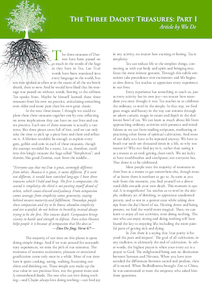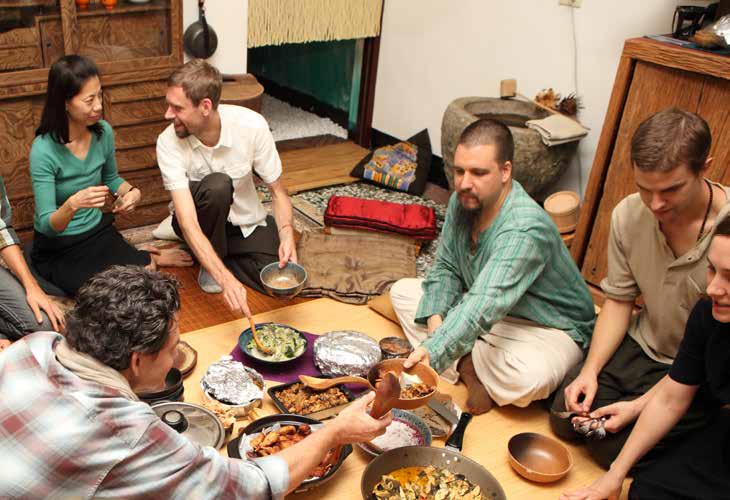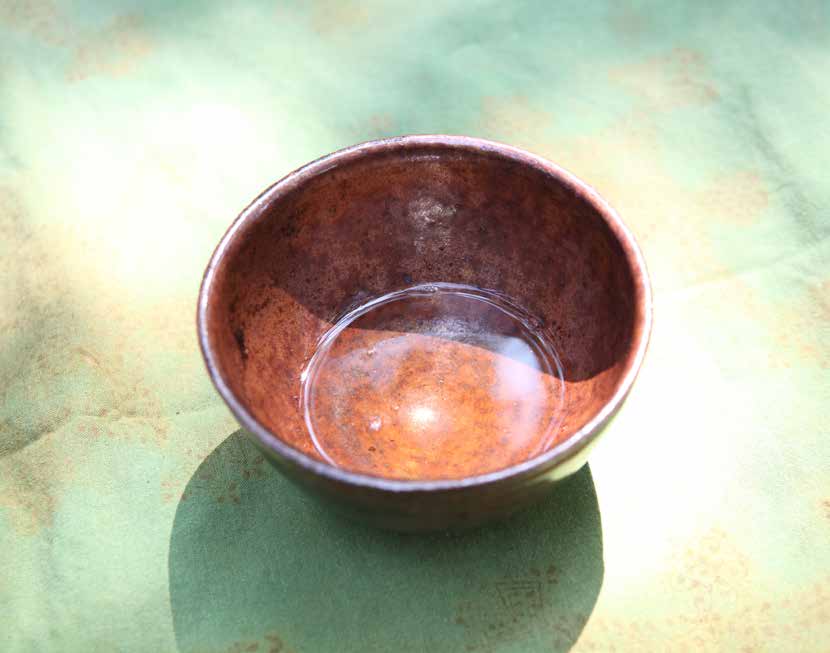
 |
|
The three treasures of Daoism have been passed on as much in the words of the Sage as they have in Tea. Lao Tzu's words have been translated into every language in the world, but not ever spoken as often as in the steam of all the tea bowls drunk, then to now. And he would have liked that his message was passed on without words, bowing to the stillness Tea speaks from. Maybe he himself learned these three treasures from his own tea practice, articulating something even older and more pure than his own great classic.
In the next three issues, I thought we could explore these three treasures together one by one, reflecting on some implications they can have on our lives and our tea practice. Each one of these treasures is actually a vast trove, like three pirate caves full of loot, and we can only take the time to pick up a piece here and there and reflect on it. A lifetime wouldn't be enough to explore every gem, goblet and coin in each of these treasures, though the attempt wouldn't be a waste. Let us, therefore, stroll into this kingly treasure the Sage called "Simplicitea"; and therein, like good Zennies, start from the middle...
"Everyone says that my Dao is great, seemingly different from others. Because it is great, it seems different. If it were not different, it would have vanished long ago. I have three treasures which I hold and keep. The first is compassion; the second is simplicity; the third is not putting myself ahead of others, which causes discord and jealousy. From compassion comes courage; from simplicity comes generosity; staying behind ensures maturity and fulfillment. Nowadays people shun compassion and try to be brave; abandon simplicity and are wasteful; do not believe in humility, instead always trying to be the first. This ensures death. Compassion brings victory in battle and strength in defense. Even when Heaven helps people it is because of compassion that She does so."
The majority of our time on this planet is spent doing simple things. And if we wait around for extraordinary experiences, we miss the pith of our existence. The moments of extreme excitement, pleasure or emotional gratification come only once in a while. Most of our time here is spent cooking, eating, walking, buttoning our shirts and drinking tea. These simple acts make up the true value in our precious lives, not the greater more easily remembered deeds. The one who can love doing nothing - and Chajin always love doing nothing - can find joy in any activity, no matter how exciting or boring. Tea is simplicity.

Tea can reduce life to the simplest things, connecting us with our body and spirit and bringing into focus the most minute gestures. Through this subtle sensations take precedence over excitement and life begins to slow down. Tea teaches to appreciate every experience in our lives.
Every experience has something to teach us, just as every activity has its own joy - no matter how mundane you once thought it was. Tea teaches us to celebrate the ordinary, to revel in the simple. In that way, we find great magic and beauty in the way sun streams through an askew curtain, magic in steam and depth in the shallowest bowl of tea. We can learn as much about life from approaching ordinary activities with presence and mindfulness as we can from reading scriptures, meditating or practicing other forms of spiritual cultivation. And most of our daily acts have to be repeated anyway. We have to brush our teeth ten thousand times in a life, so why not master it? Why not find joy in it, rather than seeing it as a means to an end: getting clean teeth. We are lucky to have toothbrushes and toothpaste; not everyone has. That alone is to be celebrated.
Most people treat the majority of moments in their lives as a means to get somewhere else, though most of us know there is nowhere to get to. As soon as you rush from this moment, you find yourself on a downward slide towards your own death. This moment is special. It is magnificent! Tea teaches us to revel in the simple, ordinary act of drinking, to appreciate unadorned pottery, and to rest in a quieter state while taking slow sips from the day's bowl of tea. Slowing down and being present, we find the world more magical. Then, we can learn to enjoy all our activities, even doing nothing. The one who can enjoy sitting and doing nothing will have found the key to enjoying life, including the more painful parts of getting sick and dying.
In Zen there is a saying that 'true purity is beyond the pure and impure'. The goal of all cultivation, in any tradition, is ultimately the end of cultivation. In other words, the highest prayer is when your every act is a prayer to God. The enlightened being sees no distinction between Samsara and Nirvana. When you have transcended the differences between sacred and profane, then all is sacred. When Bodhidharma brought Zen to China, he was summoned to meet the emperor, who asked him three questions:
"Will I get merits for all the temples I've built?"
"No!"
"Is there such thing as the Buddha?"
"No!"
"Who are you?"
"I don't know!"
Bodhidharma says there isn't a Buddha because if you are looking for the Buddha outside, you have yet to realize your Buddha-nature inside. And if you have found your Buddha-nature, resting in it you will see no Buddha because you are the Buddha. If you are looking with Buddha eyes, in other words, all is Buddha!
If we cannot find the sacred in this world, and all its so-called "ordinary" glory, we won't find it in imaginary Heavens either. Our ancestors found magic in the things they couldn't explain. Nowadays, we have better explanations for how things work. We know that the rains aren't a result of angels opening doors in the sky to let the primordial waters in; we also know Heaven isn't a city in the clouds. For that reason, a lot of people have abandoned mythology and myth-making altogether, thinking that our rational explanations can replace them. Science can indeed replace magical explanations for what causes things, and we shouldn't ever deny the proof before our eyes. Rain is caused by clouds, air pressure and temperature, etc. But the myths had another function as well: they left people with a reverence for the Sacred, immersing them in the awe of magic. As a species, we seem to have thrown the proverbial baby out with the bathwater.
Modern magic isn't about how we explain things, but in shifting our orientation towards the ordinary things, whether we can explain them or not. Myths, stories, poetry and art don't have to be used just to explain the causal relationships between phenomena. They can also help shift our perspective. We needn't use magic to explain things in order to live with magic. In Tibet, I stayed in a temple on a cliffside where mysterious lights can be observed hovering nearby at night. If a meteorologist comes along one day and explains why this phenomenon occurs, that explanation doesn't make the lights any less magical. Why does knowing the cause of something reduce it to the mundane? Isn't "mundane" just a concept? Would a rock call itself "mundane"? "Mundane" is, in fact, just a way of looking at a situation or thing. It isn't real. And it is the purpose of myth and magic to give us a new way of looking at things, and the magic need not argue with the scientific explanation in order to do so.
Let's take the ordinary act of tea drinking, for example. Just sitting here, I could see this as an ordinary day and be bored with the silence. And I don't need to invent a magical fairyland of unseen elves under my tea table in order to find this moment magical. It is magical! Every aspect of it is! Firstly, I am sitting on a giant blue ball that is full of fire, and whizzing off into unknown galaxies at thousands of kilometers an hour. And I myself am a miracle as well: the odds of there being a Wu De are astronomical in but a few generations. The odds that one particular sperm would meet one particular egg are already millions to one; then, the odds increase drastically when you add the likelihood of my parents - each single sperm out of millions - and so on to my grandparents. After just a few generations, the odds that I would be here drinking this cup of tea are incalculable. If that isn't magic, I don't know what is! And beyond the Earth and me, there is this beautiful bowl: all the colors and textures. There is the tea itself, so miraculously delicious!
Einstein said that the scientist who doesn't experience awe when observing Creation either isn't a real scientist or isn't really looking. We can find a sense of the Sacred in anything we do. And Tea teaches us to see the world in that light, celebrating the ordinary until there is no more concept of "mundane" - everything is Sacred.
This issue cannot be over-discussed: modern mythology should not be used to explain natural phenomena, rather to reinterpret our perspective in a way that recognizes how miraculous the world/Nature is, whether we understand it or not. Having a solid scientific explanation for why something in the natural world occurs is no reason to dismiss the power, majesty or breadth in that phenomenon. And if we cannot worship Nature, and attune ourselves to it, what is left to worship? If the Truth is not Sacred, how can we invent imaginary spaces to play in, pretending we are Sacred?
The new Sacred will be the simple. That is Zen, and that is Tea (they are 'one flavor', after all). Everything around you in Nature is sacred: the birds and the plants, and the way they work together in harmony. The Web of Life, the great and majestic order of the universe - from gravity to the flow of water - is oh-so worthy of our reverence. We don't need to invent Heavenly realms anymore, and most people cannot participate in myths that are meant to explain things that science can explain in a more efficient way. But everyone can recognize the miracles in all things, whether we know why they occur or not. An explanation does not reduce any thing to "mundane" unless you choose to let it do so. Understanding that killer whales were once land mammals, similar to wolves, and that they returned to the sea - understanding all that, doesn't make it any less magical! Knowing the chemical composition of tea doesn't mean it isn't Sacred.
Without a connection to the Sacred, a human life is incomplete. And to be complete, to be 'whole', is to be healthy. We, therefore, need myths. We need to be transported, connecting to the spaces and energies beyond. Myths and the rites that surrounded them have served this function for millennia. But the myths must lead from one's own context and worldview to the transcendent. Part of the problem is that we've stopped writing new myths and often rely too heavily on outdated myths from millennia ago. Those myths were written to connect people at that time to the transcendent, to attune them to Nature and to the Sacred. Since most people cannot relate to the worldviews of that time, the myths no longer transport us in the same way - they no longer convey most people to the transcendent.
We need new stories and rites, practices and self-cultivation methodology that orients us from the world we live in to the Sacred, conveying us from here to there. And it is apparent that the new myths cannot be written as explanations for natural phenomena, especially the phenomena we can explain so much better with science. Our spirituality need not be based on the gaps in science - shifting around as new discoveries are made, and always walking on unstable ground. The new myths will be about Sacred Earth, our home, Sacred Nature - in ourselves and in the world - and also on reinterpreting our perspectives to the most ordinary aspects of our lives.
If you want to be more spiritual, and have more sacred space in your life, you needn't do more of a particular activity. Being more and more centered in the Sacred is about redefining what you call "spiritual cultivation". If you define cultivation as the one hour you meditate every day, then life is not very spiritual at all. Open up your definition and you grow spiritually. This isn't just semantics. It isn't just an intellectual exercise. You have to actually be in sacred relationship to more of what you do in order to increase your spirituality in this way: The more aspects of your life you treat in a sacred way, the more cultivated you are. The more you walk, sit and drink tea spiritually, the more spiritual a life you lead. You needn't pray more, sit more or do more yoga to be more aware, but rather bring awareness to all the other activities as well. As long as you define the sacred, you bind it, collapse it and delegate God to certain places and activities. God is everywhere, and in all things. If you want to be with God more, it isn't about spending more time in church, but seeing God in all things. Gandhi said, "he who can't find God in the next person he meets need look no further."
It doesn't matter what words you use ("God", "Dao" or "Sacred"), the truth is that we needn't define self cultivation in certain terms, limiting who is cultivated and how to be more awakened. This is the same as pursuing exciting experiences on a worldly level - ignoring all the so-called "mundane" moments to get to the thrilling and pleasurable ones. True progress actually heads in the opposite direction: in celebrating the ordinary; in making sacred space around the bathtub, the toilet, raking leaves and eating lunch.

The easiest and simplest way to make tea easier is to reduce your teaware. It's easy for tea lovers to get caught up in buying too many pots, collecting rather than relating to our teaware. The best teaware is the teaware we actually use, appreciating and glowing as it is seasoned. In fact, seasoning teaware has always been one of the greatest joys of the tea lover. And the pots, cups or bowls that you aren't using would be a treasure to someone else. Rather than collecting dust on your shelves, why not give them to someone who will make them the centerpiece of their shelf, and appreciate them every day. The best way to show respect for teaware is to use it.
Simplicity in tea is also found in reducing unnecessary teaware. There is a lot of teaware that has been invented quite recently which doesn't serve much of a purpose. Over-complicating tea brewing not only results in an inferior brew, it complicates the mind. Make simplicity a regular character in your chaxi. Help your guest(s) find peace and tranquility in your tea space, and not be distracted from the tea by fancy tea brewing.
The best way to simplify your tea practice is to reduce your mind during tea. Try drinking tea in quiet, or at least discussing more meaningful topics, and always with plenty of pauses for presence and reflection. Honor the tea by paying attention to it, focusing first on the flavors and aromas, and then on the changes to your whole being. In this way, we learn to appreciate more and more of the small things in life. If you can enjoy a simple bowl of tea, you can enjoy anything. There is no need to view things as "mundane".
Tea can help reduce, and eventually erase the whole idea of 'mundane' from your life. The tea spirit is simplicity. Tea teaches us to clean and reduce. Tea teaches us to celebrate simple joys, like sitting quietly with people we love and enjoying some leaves in water. In that way, our sense of the sacred expands from the temple to the forest, from the beach to the city. In that way, our meditation grows legs and gets up from the cushion and walks upstairs, gets dressed, washes its meditative face...
